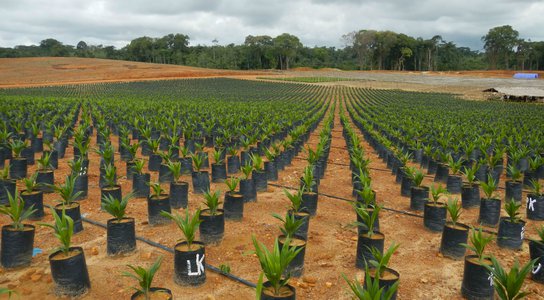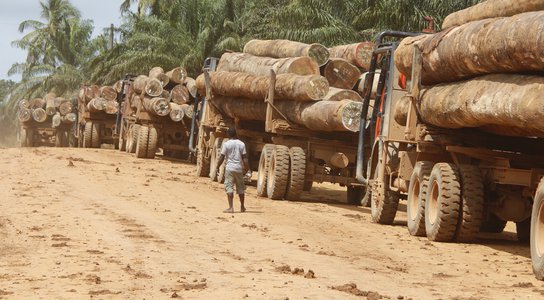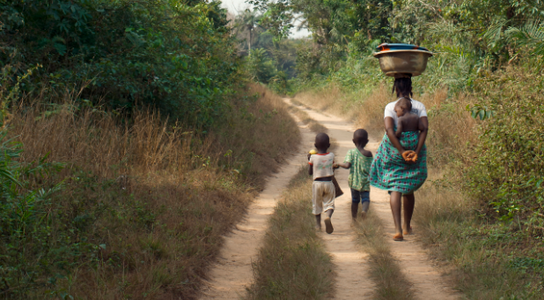Updated 31 July 2019 - see below
In 2012, while working for my anti-corruption NGO Global Witness, I sat down with a tribal chief in an isolated region of Liberia called Dugbeh. I was researching secretive logging deals in the country and showed the chief a letter signed in his name that had been used by a company to get a contract for his area. Alternating between anger and a world-weary bemusement, the chief told me that the signature was a forgery because the letter was in English, a language he did not speak.
The Dugbeh chief was not alone in his outrage. Our investigation uncovered dozens of similar “Private Use Permit” logging contracts that had been awarded by the Liberian government. These contracts were a terrible deal, letting companies cut down entire forests while promising little cash in exchange. Most galling, however, was the cynical way these contracts stripped people of their forests: awarded in the names – sometimes forged – of rural Liberians, the contracts actually gave the forests to foreign – mostly Malaysian – companies.
The heart-breaking story of how rural Liberians’ land and forests has been seized by such companies, and how some Liberians are taking a stand against it, is the focus of the new film Silas, premiering this year at the Toronto International Film Festival.
The film follows leading Liberian activist Silas Siakor who has dedicated his life to fighting for the disempowered and in 2006 was awarded the prestigious Goldman Environmental Prize. Liberia is, according to Silas, a country where corruption and land grabs like the Private Use Permits have resulted in a massive chasm between the haves and have-nots. But the film also shows how dedicated activists can make a difference, using creative and tech-savvy campaigning to help rural people regain control over their lands.
From an outside perspective, the Liberia depicted in Silas will come as a surprise. The country is led by President Ellen Johnson Sirleaf, who after 12 years in office will leave her post in January of next year. The President is an historic figure, having won a Nobel Peace Prize for helping to consolidate peace after a civil war that consumed Liberia between 1989 and 2003 and killed 250,000 people. Johnson Sirleaf is also Africa’s first democratically-elected female president, has been tolerant of a free press and public criticism, and her promise to relinquish power after her constitutionally-limited two terms in office should not go unnoticed.
Alongside these achievements, however, lies the disturbing story shown in Silas. Over the past decade, Johnson Sirleaf’s government has awarded hundreds of logging, agriculture, oil, and mining contracts covering the land and forests owned – under customary law – by rural Liberians.
Many licenses have gone to foreign companies, like an oil palm plantation four times the size of Toronto controlled by the Indonesian company Golden Agri-Resources. Some contracts have been awarded without the consent of the customary landowners, leading to community protests and outbreaks of violence. And there is evidence that companies – like some of the Private Use Permit loggers and the British mining company Sable – have bribed officials.
It didn’t need to be this way.
At the start of Johnson Sirleaf’s tenure in 2006, the President recognized that Liberia’s existing logging companies had fuelled the country’s civil war and cancelled their contracts. However, two years later the government awarded licenses to loggers that Global Witness showed were linked to the Malaysian timber giant Samling, a company notorious for destroying tropical forests. Evidence from countries like Indonesia, where oil palm plantations have long dominated, has also shown that they add little to the national economy and contribute to rising economic inequality. And crucially, there is compelling research demonstrating that the best way for a developing country to help its rural population is to recognize that they own their land and give them control.
In recent years Liberia has taken some steps to empower rural communities, possibly in response to the problems wrought by the country’s many large natural resource concessions.
In 2013, the government cancelled the Private Use Permit logging contracts and approved a Land Rights Policy, promising to recognize by statute that rural people own their land under customary law. A bill that would do this was recently tabled at the Liberian legislature, although it has yet to be passed into law. Meanwhile, in 2014 government officials signed a US$150 million deal with Norway in which Liberia pledged to help communities manage their forests themselves.
As the President steps down in January, it will be for Liberia’s next government to decide which economic path the country, and its rural population, takes.
Will Liberia finally recognize, in statute, that rural people own their land? Will the government start issuing forest licenses to communities so they can manage their own forests? And will the country’s current logging, mining, and plantation operations be allowed to expand further onto community lands?
The decisions made by Liberia’s new government will be watched closely by the Dugbeh tribal chief in particular. The logging contract covering his forest may have been cancelled, but now a palm oil company has been told by the government that it can take his land instead.
Silas Siakor and Edward Zwick, who serves as
an Executive Producer on the film Silas, are both members of the Global Witness
Advisory Board. Global Witness was not involved in the making of the film.
Update: On 30 July 2019, following a trial at criminal court C in
Monrovia, Liberia, Judge Peter Gbeneweleh, acting as judge and jury, acquitted
those on the indictment of all charges, it was reported. The defendants faced
counts of economic
sabotage, bribery, criminal facilitation, conspiracy and solicitation and had
denied the charges.


